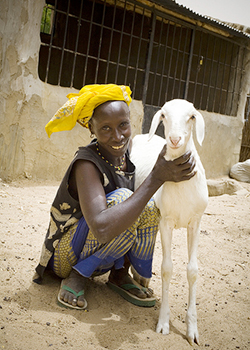 |
| Heifer has a long history in the Baback community. This picture was taken in 2001. Siga Diouf poses with one of the sheep she received from Heifer. She named all three "Heifer." |
Story by Gustave Gaye | Senior Program Officer | Heifer Senegal
In Senegalese society, solidarity is valued. It is a key element in communities and is stronger in rural areas than in the city. Relationships are energetic, and they support social stability and sustainability.
Giving to neighbors, investing in your community, is a facet of solidarity. The Heifer approach of alternative giving has taken root in many communities in Senegal. It has become a way of life. Most people who give are adults, but children are also taught about the importance of giving and that helping others is critical.
In the Baback community, adults embrace that there are many kinds of giving. The type of giving depends on the need and on the resources that are available. You give what you can, when you can. The giving can be a daily gift or a larger gift that helps someone for a longer period of time.
Short-term giving mainly deals with food need. Group leader A. Thiaw assisted a newly established villager who lacked enough resources for his family. Weekly, he gave him a calabash of millet. His mother delivered it, and, as a result, the families began building a relationship. He helped this young man many times before harvesting time.
B. Sarr, another community member, shares the milk he produces on his farm. He does this on a regular basis to improve poor families' nutrition.
When a neighbor’s reserves ran out, Mr. Barr gave the man a goat to sell, so he could buy food for his family. People in the village do this kind of giving frequently to provide others with enough resources to solve their problems. This kind of giving provides long-term care to neighbors until they can become self-sustaining.
Alternative giving considers the relationships between community members. It includes all family members. Women participate in the decision-making process, and adults model giving for their children and teach them about healthy communities. Giving can be between families or between strangers. When it is with strangers, it is often the beginning of a long and strong alliance.
According to one group member, this type of giving means “sharing the luck you have.” It is representative of how one pursues his or her life. Leaders of the Baback community state that giving depends on spirituality and, ultimately, improves social capital.